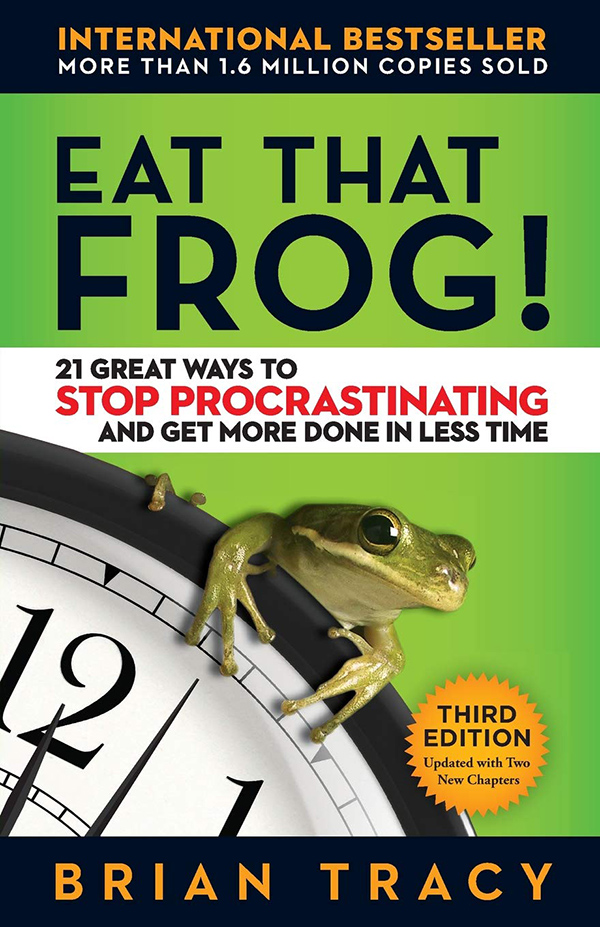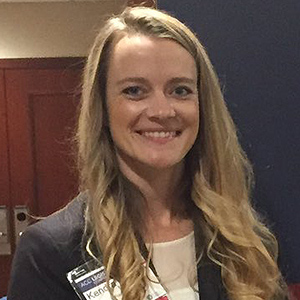Book Review: Eat That Frog

BOOK REVIEW | What if you were charged with the alluring task of eating a frog every day?
There would no getting around it – the frog must go down.
Would you choose to get it over with first thing in the morning and go on with your business, or instead think about it all day, dreading the inevitable?
Now say that frog represents the next manuscript you need to prep, the next test to study for, or whatever large task is sitting at the top of your to-do pile, atop several smaller to-dos.
Do you spring out of bed everyday ready to tackle your proverbial frog, the absolute most important task ahead of you, or more often than not does it just seem too insurmountable? Do the smaller, less important tasks find a way to fill your appetite to bursting such that the frog becomes less and less palatable?
What if, at the end of the day, tired and stuffed from all other tasks, the frog is skipped and you have failed to complete your most important task?

Brian Tracy's book Eat That Frog serves as a guide to those struggling with the seemingly never-ending to-do list.
Tracy shares his own path from vagabond twentysomething to internationally renowned author and business consultant. He accredits his success to mimicking the successful, and shares with readers a framework for squeezing the most meaningful productivity out of every day.
While there is a great deal of satisfaction in accomplishing important tasks, and key to advancement in any field, the end goal is not simply to increase productivity. Rather, by focusing on your highest yield goals, and streamlining the process to accomplishment, you avail yourself to less worry, and more time to truly relax and enjoy your coveted and well-earned free time.
Each short chapter offers guidance into one aspect of tackling the frog, or your most important tasks to complete. Most of what he describes seems fairly obvious and far from revolutionary, but reading the text I found myself guilty over and over again of many habits and behaviors that, although often well intentioned, limit productivity.
Tracy summarizes his productivity principles in 21 points, a few of which I highlight below:
- Set the table. Decide exactly what you want. Clarity is essential. Write out your goals and objectives before you begin.
- Plan every day in advance. Think on paper. Every minute you spend in planning can save you five or ten minutes in execution.
- Apply the 80/20 rule to everything. Twenty percent of your activities will account for 80 percent of your results. Always concentrate your efforts on that top 20 percent.
- Consider the consequences. Your most important tasks and priorities are those that can have the most serious consequences, positive or negative, on your life or work. Focus on these above all else.
- Focus your attention. Stop the interruptions and distractions that interfere with completing your most important tasks.
Pretty basic stuff, right? However, in my initial attempt to test several of Tracy's principles to tackle one of my own frogs (and admittingly, I may have wimped out with a very small test frog), put into practice things are not as easy.
First, there is the business of very clearly defining a goal and then actually writing it on paper, and clearly outlining steps to getting it accomplished. If you are not in the routine habit of organizing your days, weeks or months in advance, be prepared the first iteration may take some time.
I was pleasantly surprised, however, how this small act was encouragement in itself to get things completed. The next big changes came in the form of distraction removal and focus. Tracy notes, "it has been estimated that the tendency to start and stop a task – to pick it up, put it down and come back to it – can increase the time necessary to complete the task by as much as 500 percent."

While large tasks often cannot be complete in one setting, a defined portion often can. And, if you are deliberate with your time (see above), it is possible to find large blocks of time to work rather than piecemealing several small efforts together.
After removing my litany of usual distractions, I put this to the test and was able to accomplish a task I have been meaning to get to for some time – this book review!
While you may not be able to control the length of your to-do list, you can decide the order of tasks to be completed, keeping in mind the hardest and most challenging are likely to be the most fruitful for your professional and personal growth.
Tracy's book is a quick and easy read for those hoping to achieve a personal goal or enhance overall productivity in any stage of training or career.
Putting the 21 principles to use, readers should be eating frogs in no time!


